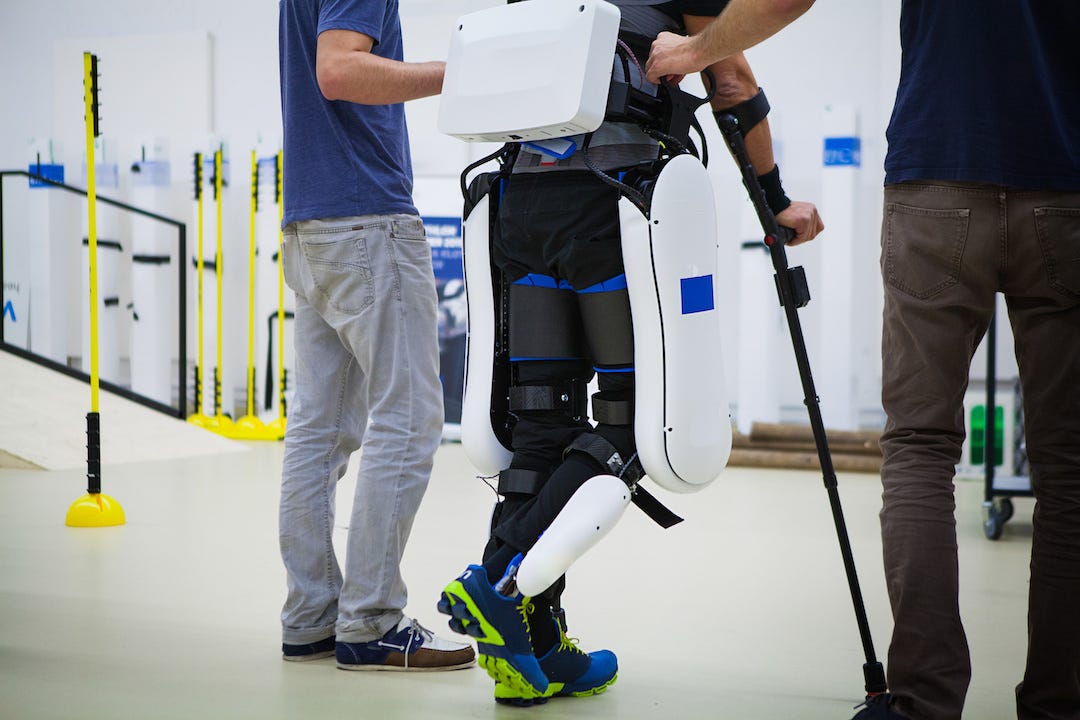A Failed $10 Battery Hobbled This Paralyzed Man's $100k Exoskeleton. The Manufacturer's Response? ¯\_(ツ)_/¯
Jockey Michael Straight says Lifeward, the maker of his $100k Exoskeleton, told him devices more than 5 years old are ineligible for repair. Also: buying an e-bike? Mind the proprietary electronics!
Former jockey Michael Straight lost the use of his legs following an accident racing at Arlington Park back in 2009 and spent years suffering the fate of many paraplegics: wheelchair bound and dealing with twitching legs, muscle atrophy and a deep sense of loss.
That changed starting in 2014, when Straight, who became passionate about helping others with spinal cord injuries, teamed up with the Miami Project at the University of Miami. There, he was given the opportunity to use an exoskeleton by Ekso Electronics: advanced equipment that provides mechanical assistance that allows paraplegics to walk. It was a transformational experience, which Straight likened to winning the Triple Crown.
Within a year, Straight had been outfitted with his own exoskeleton from the firm ReWalk Robotics (now Lifeward), courtesy of the Jockey Club Safety Net Foundation, which launched a fundraiser that raised $100,000 to purchase the exoskeleton for Straight and to pay for the insurance to cover maintenance for the device. Nearly a decade later, Straight has taken more than 370,000 steps in his ReWalk Exoskeleton and seen significant physical and mental health benefits - obviating the need for ongoing physical therapy.

$100,000….5 years?!
So when the exoskeleton began malfunctioning in recent months, Straight turned to the manufacturer, Lifeward, for assistance. As the news site Paulickreport.com reported this week, he was shocked by the answer he received.
“I’ve been told over and over again that since the machine is over 5 years old, the company will not do anything for it,” Straight told Paulickreport.com. “I get frustrated just thinking about it. It’s not fair to people like me, as hard as a paraplegic’s life is, and they’re making it harder.”
According to reports: the issue with Straight’s was not with the skeleton but with an accompanying smart watch that is used to monitor and manage the exoskeleton. What is described as “faulty wiring” in the watch appears to be the source of the malfunctions - a minor issue that could easily be addressed, according to Dennis Giese, a well known cybersecurity researcher and an expert in so-called “Internet of Things” devices like robotic vacuums.
“If its the watch, then it would be trivial” Giese said.
Manufacturer does an about face
After Straight took to Facebook to call out Lifeward and the story by Paulickreport, the news has been picked up elsewhere, including The Mirror in the UK. (And now Fight to Repair News!)
That appears to have caused Lifeward to rethink its position. In an email response to a request for comment from Fight to Repair, Kathleen O’Donnell, the Vice President of Marketing at the Lifeward said that the company has “gotten in touch with Mr. Straight…and are working to swiftly resolve the issue with his device. We are committed to helping address the problem and get him walking again as soon as possible,” O’Donnell wrote.
The company is also “conducting a thorough audit to understand any lapses in communication,” she wrote.
Matthew Straight, Michael’s brother, informed Fight to Repair News on Saturday that the company responded by sending his brother a replacement watch to manage the exoskeleton. “We are glad they have resolved the issue. I wish it could have been handled better, but we are happy they rectified the situation,” Straight wrote.
A case for a right to repair
In the meantime, the incident has provoked outrage from the horse racing faithful. In a post on the Paulickreport.com Facebook page, readers expressed outrage at the company’s refusal to perform routine service on such an expensive piece of equipment.
“This is EXACTLY why the Right to Repair movement is SO important,” wrote a Facebook user with the account name Paul Caywood. “A watch battery is an easily replaceable part, but it's more than that at stake. Companies are choosing to make repair harder or much more expensive…So yeah. Shame on Lifeward, share the knowledge of what part number the battery is, so an authorized repair can be made!”
A bigger problem: service and repair of next generation tech
Straight’s struggles to have his exoskeleton serviced highlight a growing problem facing consumers of next-generation medical devices, not to mention heavy equipment in manufacturing, precision agriculture and other critical sectors.
As manufacturers roll out software-driven, Internet connected devices, software locks and restrictions on ordinary service and repairs are proliferating, while consumers find themselves confronting arbitrary software “end of life” decisions that are divorced from the useful life of the hardware they have purchased and that are not disclosed to consumers prior to purchase.
Fight to Repair News asked Lifeward to explain its policies around support, maintenance and service of exoskeletons. Does the company distribute service manuals, software and schematic diagrams that might allow customers to do their own repairs? Does it sell replacement parts to customers or independent repair shops? The company has not yet responded regarding its policies, but we will update this story when they do.
Such questions are largely off the table for manufacturers and consumers, leaving it to incidents like Michael Straight’s dilemma to highlight the need for more clarity around repair, service and reuse policies. Stay tuned (and subscribe) for more coverage of this and other pressing right to repair issues!
Other News
Acer’s environmentally friendly laptops still the exception, not the rule
Acer brands its new laptop, the Aspire Vero 16, as the “Eco-Conscious Laptop.” The broader laptop line from Acer has been lauded for it’s repairability from organizations like U.S. PIRG. However, despite increasing emphasis of sustainability by electronics consumers, a price tag of $750 and reservations about the performance of the laptop are holding consumers back from from purchasing the device, Mashable reports.
CNBC: $400 to replace a lightbulb? Why appliance repair costs are no joke
Writer Stephanie Dhue does a deep dive into the right to repair movement in a piece for CNBC.com. Her inspiration? A blown lightbulb in her microwave. As Dhue discovered, bulb is built-in, requiring complex disassembly and professional repair, which could cost $400 or more, based on estimates from GE (the manufacturer) and other local repair shops. Those made it more expensive than replacing the appliance itself, with parts and labor ranging from $200 to $400. The underlying issue: a appliance design that makes simple repairs difficult and expensive. That’s a common problem, Dhue notes, speaking with Repair.org’s Gay Gordon-Byrne and Fixit Clinic’s Peter Mui as she weighs the various options for addressing her blown lightbulb problem.
Apple releases service manuals for iPhone 16 and 16 Pro
MacRumors called out that Apple’s launch of the new iPhone 16 models was accompanied by a less-noted but equally revolutionary development along with the iPhone 16’s lauded “AI” capabilities: repair manuals for the iPhone 16, the iPhone 16 Plus, the iPhone 16 Pro, and the iPhone 16 Pro Max. The repair manuals “provide technical instructions on replacing genuine Apple parts in the iPhone 16 models.” Apple says the information is intended for "individual technicians" that have the "knowledge, experience, and tools" that are necessary to repair electronic devices. And that means you! :-)
Other Apple iPhone 16 coverage:
The iPhone 16’s Battery Is Easier to Replace, Finally (Wired)
Apple debuts repair innovations, but will repair actually be easier? (PIRG)
Apple’s Repair Assistant: pretty far from perfect (Phone Arena)
Buying an e-bike? Mind the ‘proprietary electronics’
E-bikes are surging in popularity and evolving in leaps and bounds. So what should would-be e-bike buyers keep in mind when deciding which make and model to purchase? Repairability, among other things, says Cody Lettice, the founder and proprietor of Mobile Ebike Service LLC, which is Minnesota’s first dedicated mobile ebike service center in this interview with The Sierra Club’s Minnesota chapter. Lettice is an experienced e-bike repair pro. Asked what would-be e-bike purchasers should look out for when buying an e-bike, Lettice called out an unlikely feature:
proprietary electronics - the practice of some ebike makers to lock down their devices hindering the ability of owners and independent repair shops to service them. Lattice declared himself “a supporter of Right to Repair, as a safeguard to real environmentalism.”
AI won’t make smart devices less sh*tty
Devices like the Galaxy smart ring are positioning themselves as AI driven products of the future, but are instead perpetuating the time honored tradition of making disposable electronics. Last Month, iFixit released their findings of an unfixable Galaxy Ring with a design akin to AirPods where something as simple as a battery replacement is impossible. While outlets have said "The Smart Ring Era is Here” we know all too well the damage disposable electronics will continue to have on us and the Earth.
Green parent: I saved a lot by getting my vacuum repaired.
Self described “green parent” Emma Victoria Stokes writes for Tech Advisor about her experience when a Shark vacuum cleaner critical to her sense of order and mental health suddenly stopped working. “When I delved deeper into the world of vacuum mechanics, I quickly realised that my lack of expertise made it impossible to even know where to start,” she writes. “Back in the day, I would’ve chucked it out without a second thought, but now that I’ve embraced my green parenting era, I hauled it over to my local repair shop within the hour.”
The result? A $90 estimate to repair and service the vacuum - a big savings over the £250 or more to replace the device. “Repairing was the smarter choice and is something I wouldn’t hesitate to do again,” Stokes writes. “And, given that even mid-range models are now approaching the £400 threshold, investing in repairs could result in significant cost savings for many households.”
Refurbed.ie: this Irish site wants to buy your old electronics
Techcentral.ie profiled Kilian Kaminski, the co-founder of refurbed.ie, a new Ireland-based website designed to buy, refurbish and resell old electronics. “Many households have a hidden stash of broken, unused, or unwanted electrical items. Irish consumers can play a key role in recycling these devices, helping give them a new purpose and recover the valuable raw materials they contain. Our production and consumption habits need to undergo serious change, and we hope this highlights to consumers how easy and beneficial it can be to participate in the circular economy.” The site is just the latest to emerge as the market for second hand tech grows, as evidenced by the growth of sites like backmarket.com in recent years.






